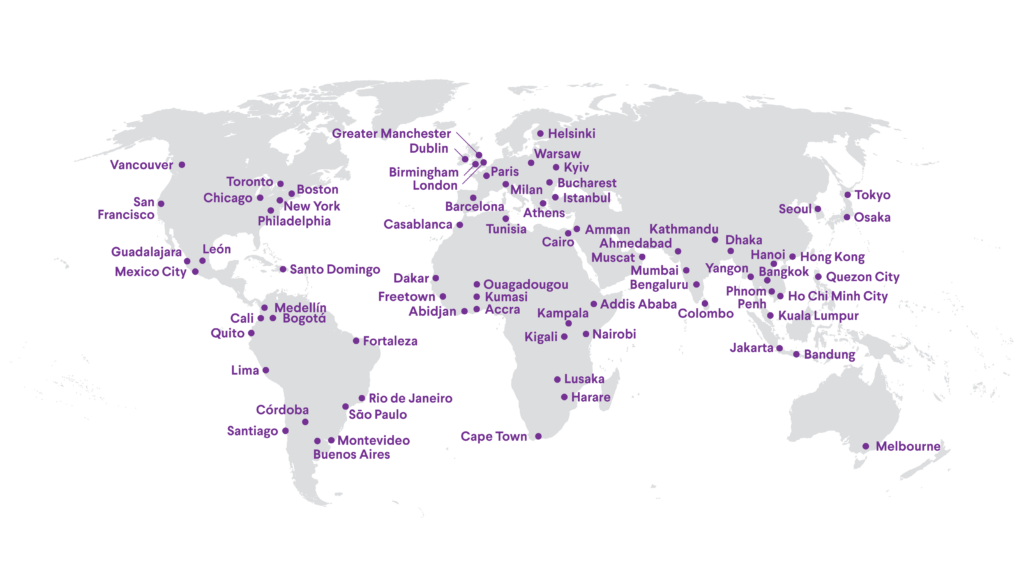Noncommunicable diseases (NCDs) and injuries kill almost 46 million people globally each year. They are responsible for 80% of global deaths.
With most of the global population now living in urban settings, cities and their leaders play a critical role in developing, implementing and enforcing policies to create healthy environments for healthier populations.
The Partnership for Healthy Cities, supported by Bloomberg Philanthropies in partnership with the World Health Organization and Vital Strategies, is a global network of 74 cities whose mayors have committed to prevent NCDs—including cancer, diabetes, heart disease and chronic lung disease—and injuries through proven interventions.
As implementing partner in the initiative, Vital Strategies provides technical assistance, supports communication and public relations efforts, and disburses grants to participating cities. The Partnership regularly convenes cities in the network to support capacity building and share strategies, and to foster networking opportunities.
The Partnership launched in 2017 with 54 cities and has now expanded to 74 cities. In March 2020, the Partnership increased its scope to provide immediate assistance in the urban response to COVID-19. By collaborating with WHO and Resolve to Save Lives, the Partnership enlisted the world’s leading experts on epidemic prevention.
In 2021, the Partnership launched the Policy Accelerator to support cities in the network seeking to create and adopt strong public health policies and to institutionalize development processes for future policy. The Policy Accelerator is comprised of a series of trainings and city-to-city discussions through which cities can establish the technical foundations and political strategies needed for navigating the complex social and political hurdles to policy adoption.

Selected City Activities
Ahmedabad, India: Ahmedabad completed a WHO STEPS-based survey that is the city’s most comprehensive assessment of NCD risk factors. Comprising door-to-door insights from over 5,700 residents, the Partnership-supported research marked a major milestone in the city’s efforts to tackle increased NCD rates, with special concern about the use of smokeless tobacco, which increased throughout India during the COVID-19 pandemic,
Lusaka, Zambia: With more than 70% of school-age children in Zambia going to and from school by foot daily, high fatality rates among the very young are a major concern. With support from the Partnership, the capital city has improved safety in the areas surrounding seven schools through infrastructure upgrades and signage—and in 2022 issued a decree reducing speeds in school zones to 30 km/h.
Córdoba, Argentina: In Argentina, almost 50% of schoolchildren consume sugary drinks two or more times a day—at great risk to their health. The city of Córdoba launched a “Córdoba Chooses Water” initiative as part of the city’s work with the Partnership’s Policy Accelerator to develop a comprehensive healthy school food environment policy. Installation of water fountains and a communication campaign are to be followed by a ban on junk food and soda advertising and other citywide measures.
Greater Manchester: Doubling down on its commitments to reduce smoking prevalence and expand outdoor smoke-free areas, Greater Manchester, with Partnership support, spearheaded a community engagement campaign aimed at enlisting public input on four proposed sites. After collecting feedback from 1,700 residents, the city planned to open its first smoke-free park in 2023.
Phnom Penh, Cambodia: To strengthen local implementation of a 2019 national ban on school sales of sugary drinks and unhealthy snacks, the city of Phnom Penh worked with the Partnership’s Policy Accelerator program on a series of strategies, including procurement and installation of 100 water fountains in 76 primary school.
A Global Network of 74 Cities

Each of the Partnership’s 74 cities has selected one of these 14 interventions to prevent NCDs and injuries:
1. Create a smoke-free city
Introduce, pass and enforce legislation and regulations to make all indoor public places, workplaces and public transport 100% smoke-free
2. Ban tobacco advertising
Introduce, pass and enforce legislation and regulations establishing comprehensive bans on tobacco advertising, promotion and sponsorship, including a ban on display at the point-of-sale
3. Raise tobacco taxes or levies/fees
• Increase excise taxes and prices on tobacco products; or
• Increase subnational tobacco tax revenue
4. Tax sugary drinks
Adopt, implement and enforce effective taxation of sugary beverages
5. Set nutrition standards for foods served and sold in public institutions
Adopt, implement and enforce nutrition standards in public settings (e.g. schools, hospitals, childcare sites)
6. Regulate food and drink marketing
Adopt, implement and enforce restrictions on marketing sugary drinks and/or unhealthy foods
7. Create healthier restaurant environments
Adopt, implement and enforce foodservice policies (e.g. calorie labelling, sodium labelling, trans fat ban)
8. Reduce speeding
• Enhance and/or enforce speed limits; or
• Implement road designs that reduce speed and protect pedestrians
9. Increase motorcycle helmet use
Enhance and/or enforce laws mandating compulsory use of helmets while riding two-wheelers
10. Reduce drink driving
Enhance and/or enforce drink-driving traffic laws
11. Increase seat-belt use
Enhance and/or enforce laws mandating compulsory seat- belt use
12. Promote active mobility
• Increase cycling via bike share programs and/or street design; or
• Implement Safe Routes to Schools
13. Prevent opioid-associated overdose deaths
• Establish a naloxone distribution program; or
• Establish community-based harm reduction services (e.g., syringe exchange, drop-in center)
14. Enhance public health data and monitoring systems
• Conduct a population-based survey of risk factors for NCDs/injuries; or
• Conduct targeted air monitoring to identify important emissions sources and their impact on ambient air quality and health
For more information visit cities4.health.org
